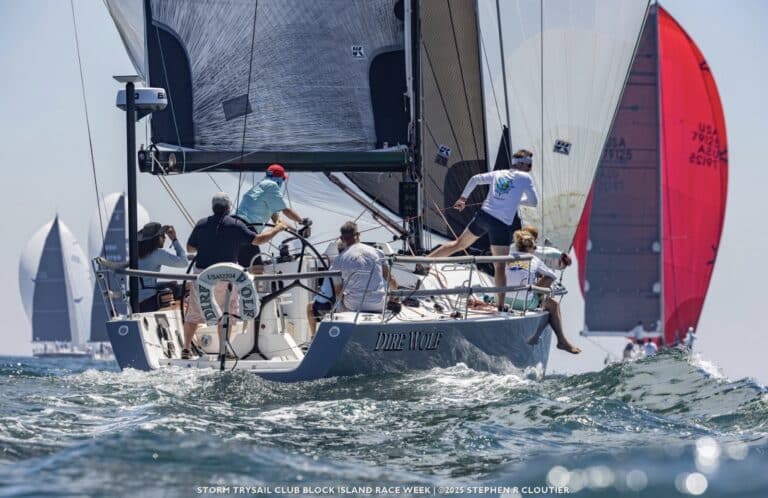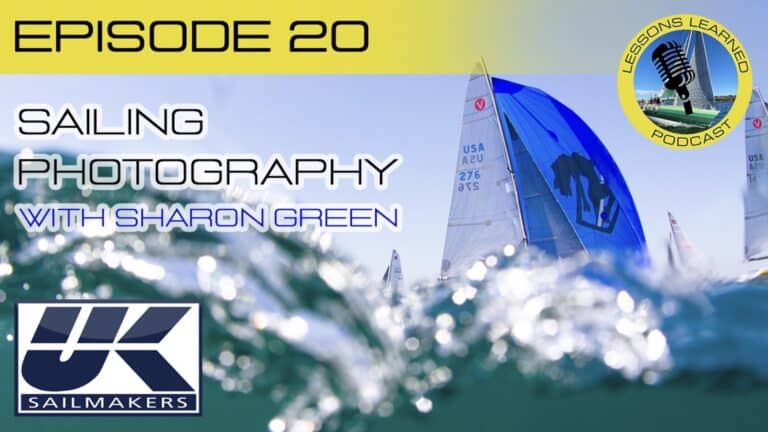UK Sailmakers is dedicated to supporting sustainable sailing to ensure that the ocean can be enjoyed by all for generations to come.
We are taking global action to minimize the environmental impact of our sail manufacturing processes and help protect the world’s oceans. One key initiative is our partnership with Challenge Sailcloth, from whom we source the majority of laminates used in our X-Drive® sails. Challenge Sailcloth produces laminates using recycled components that offer the same strength and durability as traditional materials. The new X-Drive laminates are made with partially recycled yarns and 100% recycled film, which boasts greater UV resistance than virgin films. This is a significant step sailmakers can take to reduce plastic waste that might otherwise end up in our oceans.



Trash pulled from the sea compared to perfect ocean sailing conditions during a Hawaii race.
At UK Sailmakers Northwest in Sidney, British Columbia, we are acutely aware of the growing problem of marine debris, particularly in the North Pacific Gyre. This vast accumulation of garbage poses significant challenges for sailors navigating races to Hawaii, such as the Pacific Cup, TransPac, and Vic Maui. JOY RIDE, a J/122E based in the Pacific Northwest, reported their shock at the volume of debris encountered during the 2018 Vic Maui Race, raising concerns about the impact on marine life, asking, “How are our leviathan friends faring in a sea of fish nets, plastic cups, and other urban waste?” In the same year, OXOMOXO, a Swan 39 from Seattle, stopped to rescue a distressed sea turtle trapped in a discarded fishing net. The risk of sailboat entanglement, particularly when sailing in breezy nighttime conditions, is also a serious concern.
During the 2018 Pacific Cup, Stuart Dahlgren, owner of UK Sailmakers Northwest, was alarmed by the amount of debris encountered. While racing on his Santa Cruz 70, WESTERLY, he reported, “We had to back down seven times to free debris from our keel and rudder. At one point, we snagged a large piece of commercial fishing net around the keel, which almost required a swim to remove. Other items included a huge chunk of molded radiator hose, various bits of line, plastic bags, and small pieces of net.” In 2022, Stuart and his crew observed significant amounts of small floating garbage, primarily gear from commercial fishing, floats, and plastic, but fortunately avoided catching any of it.
Oliver McCann and Brendan Huffman, from UK Sailmakers Los Angeles, share a deep commitment to environmental conservation. Oliver, who holds a Master’s Degree in Environment and Sustainability from UCLA, has spent over 40 years serving Southern California sailors from their Marina del Rey location. Brendan, a lifelong sailor, reflected on his experience during the Singlehanded TransPac Race, saying, “The debris I pulled off my rudder last year had been in the water so long it had developed an ecosystem, ready to become an invasive species somewhere else.”
12 Sustainable Boating Practices
- Opt for wind or human-powered vessels whenever possible: Reduce fuel consumption and lower your carbon footprint by choosing sailboats, kayaks, or other non-motorized watercraft.
- Require reusable water bottles: Encourage crew members to bring refillable water bottles to minimize single-use plastics onboard.
- Pack food and supplies in reusable containers: Bring meals and supplies in reusable containers to reduce onboard waste and minimize trash.
- Anchor responsibly: Use designated mooring areas and avoid anchoring in sensitive ecosystems, such as coral reefs or seagrass beds, to protect marine habitats.
- Choose eco-friendly antifouling paint: Opt for environmentally friendly antifouling paint and maintain a clean hull by sailing frequently rather than scrubbing.
- Provide secure trash and recycling bins: Ensure everyone on board knows the location of designated trash and recycling receptacles to properly manage waste.
- Use biodegradable products: Choose biodegradable soaps and reef-safe sunscreens to reduce harmful chemical runoff into the water.
- Recycle used fishing line: Dispose of fishing line at marina recycling stations or your local tackle shop to prevent harm to marine life.
- Collect marine debris: Use a net to scoop up marine debris while boating or on docks, and dispose of it properly.
- Harness solar power: Install solar panels to reduce your reliance on diesel for charging batteries, cutting down on emissions.
- Follow responsible fueling and pump-out procedures: Adhere to best practices for fueling and waste disposal to prevent spills and protect the water.
- Participate in clean-up events: Join marina or beach clean-up events to help maintain a clean and healthy marine environment.



Heather Mahady participating in a local beach clean-up event.
More than a decade of volunteer beach clean-up data collected by the Surfrider Foundation reveals that over 60% of beach debris originates from land-based sources.
At UK Sailmakers, we are committed to minimizing waste during sail production. Our lofts utilize advanced software to optimize cutting patterns, significantly reducing sailcloth off-cuts. Innovations like zippered luff spinnakers help prevent waterway pollution by eliminating the need for yarn or elastic used in traditional spinnaker banding. Additionally, sailcloth remnants are repurposed for future sail repairs, creating duffle bags for local regatta prizes, and more.
Looking ahead, UK Sailmakers has several new environmental initiatives and partnerships planned for 2023. We are dedicated to reducing the environmental impact of sailing and protecting the ocean and planet for future generations.





I see you say that 60% of waste comes from land-based sources. SO, 40% of plastic waste is produce by the SEA???? Dream on get serious and stop using plastic to make sails.